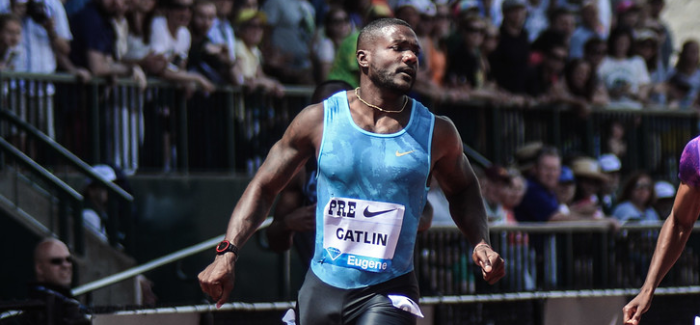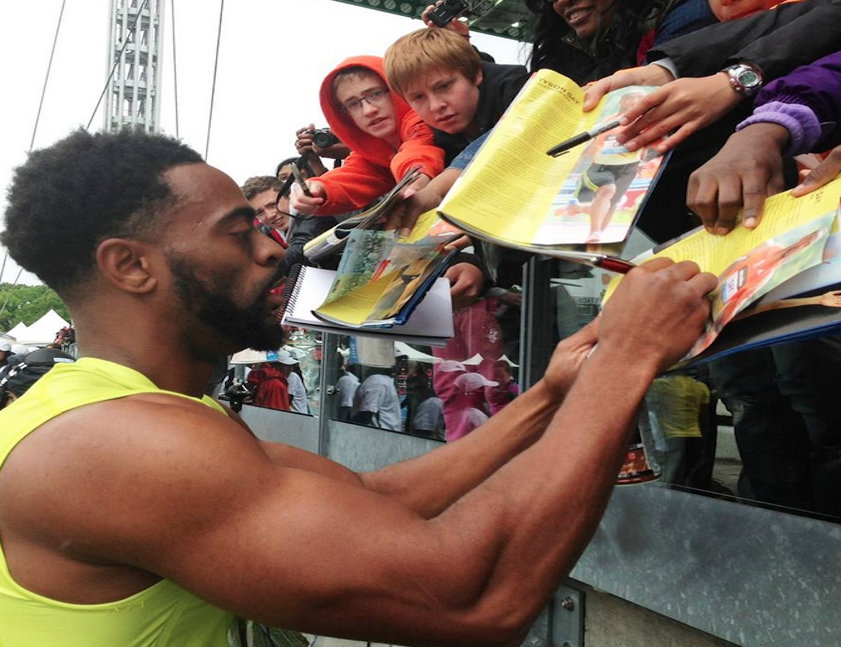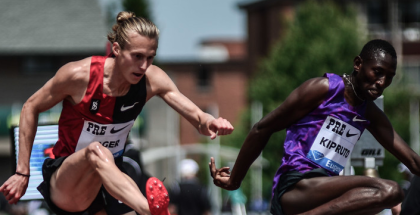SPEED Rankings #3: Sprints and Hurdles
Kevin Sully | On 17, Jun 2015
Usain Bolt is running slower than he did when he was 17. Andre De Grasse is giving Canada their best sprint hope since Donovan Bailey. The women’s high hurdles is a wonderful mess to figure out. It’s time for another edition of the SPEED Rankings. Remember, these rankings are unscientific and most likely inaccurate. They are based on the predicted finish order if the World Championships were held right now.
Men’s 100
1) Justin Gatlin
2) Andre De Grasse
3) Usain Bolt
4) Asafa Powell
5) Tyson Gay
No matter how you look at Bolt’s 20.29 in New York it was disappointing—the time was slow (even considering the head wind), the margin over the field was way too small and he didn’t look fluid at all. The biggest indictment on his run came from Bolt’s own observations. After the race he said it was the worst curve of his career and wondered whether he would be able to get it together in time for the World Championships. The 200 is Bolt’s better event so it’s safe to assume that if he lined up for the 100m on Saturday, the results would be similar.
Across the country in Eugene, De Grasse ran wind-aided 9.75 and 19.58 at the NCAA Championships. His performances were everything Bolt’s weren’t–smooth, electrifying victories over fields stronger than Bolt faced. And De Grasse did it in races 45 minutes apart.
The wind and the fast track of Eugene certainly helped his time, but a margin of victory of .13 in the 100 over Trayvon Bromell and a gap of almost .3 back to Dedric Dukes and Bromell in the 200 was eye-opening. Right now, De Grasse improvement curve is so rapid that it’s not inconceivable that he continues to get better throughout the summer.
How will he deal with the pressure of being the newest sprint sensation? More specifically, how will he cope with being thrust into the role of the last remaining person who can beat Justin Gatlin? Fortunately for him, De Grasse is too young to be burdened by legacy. If you are one of those who are concerned with the ramifications of a Gatlin win (and there are plenty of those), I’m sure De Grasse isn’t concerned about that either. He’s running way above his head right now and with the freedom of knowing this is just the first of many major championships.
That is his only edge on Gatlin. He isn’t faster than him, at least not yet. He doesn’t have any experience at the world stage. But De Grasse can approach the World Championships with a level of relaxation that nobody else in the field can match.
Women’s 100
1) Shelly-Ann Fraser-Pryce
2) Murielle Ahoure
3) Tori Bowie
4) English Gardner
5) Blessing Okagbare
The Prefontaine Classic pushed this event to another level. Six women ran 10.87 or faster and the blanket finish in both sections set the stage for a very competitive summer. Shelly-Ann Fraser-Pryce was the narrow winner and holds the top spot because when she runs like Shelly-Ann Fraser-Pryce no woman can beat her. If you take the five women from above, add in Elaine Thompson, Jenna Prandini and Veronica Campbell-Brown you’d have a very difficult time choosing the medalists. Arguments could be made for all eight.
Ahoure beat Campbell-Brown in Oslo and barely lost to Fraser-Pryce in Eugene. Gardner and Bowie won the 100 and 200 in New York respectively. The American team is decided next week and right now it looks like it will be Bowie plus two runners with University of Oregon connections, Gardner and Prandini, on the team. Carmelita Jeter and Tianna Bartoletta both were off the fast pace in Eugene, but could work their way into the top three. Prandini will be racing at home and only has to hold her NCAA championship form for two weeks. Plus, she won’t need to run 4 events this time around.
Men’s 200
1) Justin Gatlin
2) Andre De Grasse
3) Usain Bolt
4) Warren Weir
5) Dedric Dukes
Same top three as the 100. De Grasse is a bit better here than in the 100. Gatlin looks rock solid in both. There isn’t nearly the depth or different number of possible outcomes in the 200 as there is in the 100. Basically the last few years of the men’s 200 shakes out like this…..
First, you take everyone from the 100 and throw them in the mix…then take away a few people because they just don’t want to run a 200….then take away a few more who planned to race, but dropped because they got hurt during the 100 or just don’t want to risk injury…… And that is how you make a 200 field.
Hopefully this changes. The 200 has basically served as a coronation for the 100 champion. Yes, much of that has to do with Bolt being so dominant since 2008. The 200 only really gets interesting when their are two titans on the line or when someone drops down from the 400. I don’t think Michael Johnson is putting those gold shoes back on unfortunately….
Gatlin’s 19.68 from the Prefontaine Classic is the fastest wind legal time of the year. Dukes posted a legal 19.99 and a wind-aided 19.86 to finish runner-up to De Grasse’s “what was that?!” race in Eugene. Warren Weir pulled out of New York City costing him his best chance to ever beat Usain Bolt. Oops.
Women’s 200
1) Allyson Felix
2) Tori Bowie
3) Shaunae Miller
4) Murielle Ahoure
5) Dezerea Bryant
I’m chalking Felix’s loss to Jeneba Tarmoh as just a fluke instance of Tarmohgeddon. Felix still has a clear path to the gold medal, especially if Shelly-Ann Fraser-Pryce stays away from running curves this year. Felix has said that the double isn’t possible in Beijing because of the schedule. So, if she has to pick between the 200 and 400 it’s hard to see how she turns down an opportunity to run her preferred distance against an easier field. If she opts for the 400 it’s because she wants a challenge, and/or she is just getting bored winning gold medals in the 200.
The other possible rationale for choosing the 400 is to lay the groundwork for a potential 200/400 double at the Rio Olympics. Like this year’s World Championships, the order of events in Rio won’t allow for someone to be competitive in both the 200 and the 400. A Felix win at the World Championships, could be the nudge the IOC (or whoever is in charge of the schedule) needs to show that Felix is worthy of a schedule change. Though she has tons of potential, she is still unproven in the 400. At least in terms of gold medals.
When they rearranged the order to accommodate Michael Johnson’s double in 1996, he had already won both in one meet at the World Championships the year before. Felix doesn’t have that luxury because of the Beijing schedule. Her best chance might be to win the 400 this year to demonstrate that she could win the 200 and 400 if given a reasonable amount of rest between the two events.
Enough theorizing for now…..Bowie ran against the spin cycle in New York (-2.8 m/s headwind) and still came away with a 22.23–fifth fastest time of the year. Miller ran the 400 in New York, but still has the second fastest time of the year. Bryant beat Jenna Prandini to win the NCAA Championships in 22.18.
Men’s 400
1) Kirani James
2) Wayde Van Niekerk
3) Lashawn Merritt
4) Vernon Norwood
5) Javon Francis
James keeps rolling along after trouncing another field at the Prefontaine Classic and dipping under 44 seconds for the first time this year. Van Niekerk popped up out of nowhere to run – 44.24 in New York, second on the year to James. Deon Lendore pulled up in the NCAA Championship final and dropped out of the race. With Lendore hurt, Vernon Norwood took home the title and looks to be a lock for the US team. The Americans gets four spots in this year’s World Championships, but the group isn’t as strong as it usually is at this point of the year. Of the top 15 times of the year, the Americans are responsible for only two.
Lashawn Merritt was a half second back from James in Eugene so that gap appears to be holding steady. Javon Francis set another personal best last weekend, running 44.50 in Kingston. Keep an eye on Steven Gardiner of the Bahamas. He is in that sweet spot for 400 runners (19-years-old) and ran a huge 44.64 to win in Oslo.
Women’s 400
1) Allyson Felix
2) Francena McCorory
3) Sanya Richards-Ross
4) Shaunae Miller
5) Stephenie Ann McPherson
I’ve already exhausted the possibilities of what race Felix will run, at least for this post. Regardless of what she chooses, I still think right now she is the best 400 runner in the wordl. Luckily we get to see her, McCorory and Richards-Ross go head-to-head-to-head at the US Championships next week.
Felix beat Richards-Ross in their last match-up at the Prefontaine Classic. McCorory wasn’t in Eugene, but set the world lead in New York with a 49.86. Outside of the US, Miller and McPherson are the best hopes to break up the potential American medal sweep. McCorory handled Miller easily last week. McPherson has run under 51 seconds five times this season.
Men’s 110 Hurdles
1) David Oliver
2) Pascal Martinot Lagarde
3) Jason Richardson
4) Aries Merritt
5) Omar McLeod
Oliver won in New York and is chugging along with five races under 13.20 in 2015. I give him the slight edge over Martinot Lagarde even though the Frenchman won his only race of the year in Eugene and set the world lead of 13.06.
The other Americans are rounding into form with Merritt looking good at the Prefontaine Classic and Richardson finishing runner-up to Oliver in New York. McLeod ran 13.01 at the NCAA Championships with a +3.9 wind, which is probably more of a hazard than a help in the high hurdles. Aleec Harris has cooled off after his great start to the season and will be part of the scramble for the four US spots on the world team.
Women’s 100 Hurdles
1) Jasmine Stowers
2) Sharika Nelvis
3) Brianna Rollins
4) Tiffany Porter
5) Kendra Harrison
The enormous gulf between Stowers and everyone else has shrunk considerably over the last month. Stowers won in Oslo to get back on track after a nightmare couple of races where she hit hurdles in Rome and false started in Birmingham. Nelvis looks very steady with wins in Rome and New York and has settled into the 12.5/12.6 range. That won’t be enough to win gold if Stowers goes nuts again and start rolling off 12.3s, but if she doesn’t Nelvis is poised to take advantage. Harrison enters the top five after winning NCAAs in 12.55. The US Championships will eliminate at least five American women who could medal in Beijing.
Pearson is out for a year from a fall during the battle of Rome where almost half the field crashed out. Her absence makes the event more America heavy.
Men’s 400 Hurdles
1) Johnny Dutch
2) Bershawn Jackson
3) Javier Culson
4) Michael Tinsley
5) Michael Stigler
Dutch won in Eugene/Rome and has two of the three fastest times of the year. He’s hasn’t made a US team since 2009–will he get over the hump this year? He has been competing without a sponsor all season. Dutch’s training partner, Bershawn Jackson is in good position to make another run at a gold medal. Neither man was in New York and Culson took advantage and won the race comfortably. Stigler won the NCAA Championship on Friday and has helped contribute to the American dominance this year. The US has the top eight marks of the season. Where is the rest of the world?
Women’s 400 Hurdles
1) Kaliese Spencer
2) Shamier Little
3) Kendra Harrison
4) Georganne Moline
5) Wenda Nel
Spencer doesn’t have the fastest time in the world, but does have wins in Oslo, Shanghai and Birmingham. The race of the year came at NCAAs, Little ran 53.74 and Kendra Harrison placed second in 54.09. Harrison is good bet in both hurdle races, if she wants to double her odds at making the team she’d need to run five races in three days at the US Championships. Moline is rounding into form with three promising results so far. Nel is the unknown name of the group and has a 54.37 to her name. Still waiting for Zuzana Hejnova to look like herself.
-
Johnny Dutch made the Worlds team in 2009



















Comments